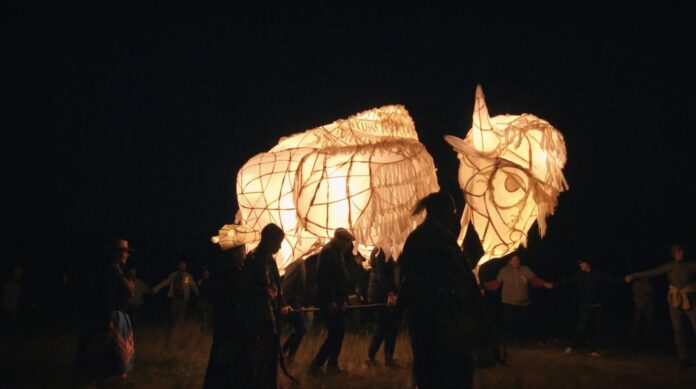
On Feb. 19, the Gallery on Queen St. held a free showing of the 2024 documentary Singing Back the Buffalo.
Directed by Tasha Hubbard, the film explores the efforts of Blackfoot Elder Leroy Little Bear to bring Buffalo back to their Great Plains home.
The event was a collaboration between the St. Thomas University Environment and Society Contesting Energy Discourses through Action Research (CEDAR) project, the Wolastoq Grand Council and Cinema Politica Fredericton.
CEDAR’s lead researcher, Susan O’Donnell, was pleased with the turnout.
O’Donnell’s project focuses on conversations about energy and who is part of the dialogue.
“We are looking at the discourse, seeing whose voices are missing and then the action research is trying to amplify those missing voices,” she said.
Some voices left out of the conversation include indigenous, non-governmental organizations and local activists.
Nearly every chair was taken at the showing.
The documentary showed how buffalos are vital to the sustainability of the plains, showing how their hooves turn the soil while travelling, how seeds are transported in their fur and how their droppings fertilize the ground, “revitalizing” the earth and fighting climate change.
Wolastoq Grand Council Grandmother Alma Brooks was also pleased with the turnout.
She strongly believes that it’s important for films like Singing Back the Buffalo to be seen by wider audiences.
“It gives people another way of looking at things and also gives people a chance to talk … and share ideas with each other,” she said.
Local documentary fan, Dirk Groenenberg, thinks that it’s key for these films to be seen by the community.
Despite the setbacks that are shown in the piece, Groenberg hopes the buffalo will return home.
“Indigenous people are able, on their own power and on their own decision making, to bring back the buffalo,” he said.
Finishing up their second year of the five-year project, O’Donnell expects it will extend to six since they have partners at the Université de Moncton and the University of British Columbia.
“There’s a lot of training that’s happening and engaging the students in various activities, which is great,” she said.
She added, “Research is always slow, gathering data, working with students who may have a limit on 10 hours a week or whatever, but I’d say we’re making good progress.”
